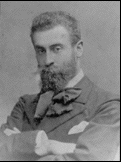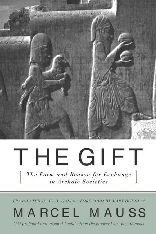Dedication: Mauss, Marcel-Israël (1872–1950), French anthropologist and sociologist; nephew and colleague of Durkheim; often considered the father of modern French anthropology. Although Mauss never did fieldwork, he turned the attention of French sociologists, philosophers and psychologists towards ethnology. He also tried to display the close relationship between Anthropology and Psychology. He did this through his many works. Among one of his earliest is Sacrifice: Its Nature and Function in 1899. His most influential is thought to be The Gift written in 1925. This work concentrated on his theory of "Gift Exchange." It explores the religious, legal, economic, mythological and other aspects of giving, receiving and repaying in different cultures. He envisions earlier societies as having individuals who were "less sad, less serious, less miserly, and less personal than we are. Externally at least, they were or are more generous, more giving than we are. . . . We will rediscover motives for living and acting that are still prevalent in many societies and classes: the joy of public giving; the delight in generous expenditure on the arts; the pleasure in hospitality and in private and public festival."
Marcel Mauss was regarded as a highly intellectual man with an encyclopedic mind familiar with an exceptional breadth of ethnographic and linguistic knowledge. He was an inspiration to many.


References:
Mauss,
Marcel, Encyclopedia Britannica. Encyclopedia Britannica Inc., 1996.
Mauss,
Marcel, The Concise Columbia Encyclopedia. Columbia University Press, 1991.
Winters,
Christopher, International Dictionary of Anthropologists. New York: Garland
Publishing, 1991. pp. 462 - 463.